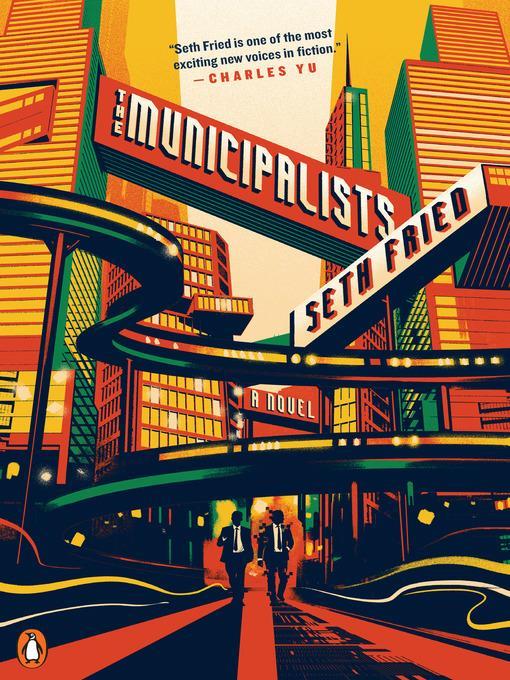
The Municipalists
A Novel
کتاب های مرتبط
- اطلاعات
- نقد و بررسی
- دیدگاه کاربران
نقد و بررسی

October 29, 2018
Fried’s lackluster debut explores the relationship between users and technology in an urban thriller constrained by its narrow scope. After a terrorist cyberattack on the United States Municipal Survey (USMS) headquarters in Suitland, Md., investigator Henry Thompson, an introverted longtime employee of the organization, travels to the megacity of Metropolis, where he searches for the USMS employees behind the supposed inside job. Accompanying him is a hologram AI named OWEN, who creates limitless illusions and has a strange thirst for liquor. Murderous thugs pursue Henry, who shares their violent inclinations and easily accepts that he may have to murder and torture for his job. With OWEN as his primary confidant and weapon, Henry follows clue after clue to put a stop to the rogue faction. The relationship between Henry and OWEN is simple and repetitive, and with a small and male-dominated cast, the story is empty and quiet. The breadcrumb-trail plot and stiff protagonists undermine both the serious thriller concepts and the contrasting elements of the bizarre. Agent: Stacia Decker, Dunow, Carlson & Lerner.

January 15, 2019
A bureaucratic bean counter and a snarky artificial intelligence team up to find a terrorist working to destroy America's largest near-future city.Fried (The Great Frustration, 2011) offers a very weird debut novel that somehow manages to transport Conrad's Heart of Darkness to a futuristic mega-city with a minimum of social satire but grand sociological observations about cities on the scale of Geoff Manaugh's A Burglar's Guide to the City (2016). Our Everyman hero is Henry Thompson, an efficiency expert with a murky government entity and, as one nemesis notes, "the biggest milquetoast bean sorter in the history of the United States Municipal Survey." After a number of the agency's facilities are bombed and its artificial intelligence platform is infected with a virus, Henry's boss, Theodore Garrett, sends him to the futuristic city of Metropolis to hunt down the suspect. Henry's partner in this venture is the aforementioned AI, OWEN, a hard-drinking, newly sentient personality who manifests as a hologram but turns into a bulldog and faints at the sight of blood. These two unlikely partners are chasing Terrence Kirklin, their agency's station chief in Metropolis, who has clearly gone rogue. Kirklin has disappeared with Sarah Laury, an 18-year-old Olympic gold medalist, playwright, genius, and, oh yeah, the daughter of the mayor of Metropolis. Fried can't quite decide what he wants to play here--it's too buddy-cop comic to be a hardcore thriller and too tongue-in-cheek about technology to be a serious social satire, but it's still a fun read. The narrative is packed with irrelevant but fun-to-read set pieces including a gunfight in a museum, a couple of car chases, and a few deadlocks that are usually solved by OWEN's deus-ex-machina abilities. Kirklin and Laury are mostly ciphers, and not very interesting ones at that, but the banter between the drab Henry and the supercilious OWEN is worth the price of admission.A fun, relatively harmless comic thriller about the nature of cities, the threats of technology, and how to blow stuff up good.
COPYRIGHT(2019) Kirkus Reviews, ALL RIGHTS RESERVED.

Starred review from March 1, 2019
In near-future Suitland, agent Henry Thompson of the United States Municipal Survey (USMS) performs efficiently despite the oppressive mutation of labor and everyday life. Shadowed by HQ in Metropolis (a city roughly the size of Rhode Island), amid the daily churn of meetings covering infrastructure tweaks, 3-D projections of subway tunnels, and arguments over Rust Belt carbon emissions, Henry seems to thrive. When his middle-aged station chief vanishes with the mayor's 18-year-old daughter, the only thing worse might be a cyber attack on OWEN, the company AI/supercomputer. Eerily handsome, OWEN's blue-eyed avatar and his wisecracking ways prove recoverable from the virus that, among other things, triggers a self-destruct code in employee cell phones. Public outrage over the USMS drone fleet crashing into Metropolis's buildings demands action: Henry and OWEN are covertly tasked with sussing out a major terrorist plot. Public institutions are attacked, and the two reluctantly confront conspiratorial players (and Esperanto) driven by a surprising nemesis. VERDICT Fried's debut explores issues likely to affect everyone--and pokes predatory capitalism with a sharp stick, attracting readers of darkly absurd science fiction à la Philip K. Dick, Charlie Jane Anders, and Warren Ellis.--William Grabowski, McMechen, WV
Copyright 2019 Library Journal, LLC Used with permission.

February 1, 2019
Fried's buddy-cop science-fiction debut features an infrastructure-obsessed bureaucrat and a rogue AI system teaming up to try and take down a mysterious conspiracy set on destroying the idyllic city of Metropolis. The obnoxious antics of artificial intelligence OWEN, who finds both children and seniors suspicious, and who spends much of his time figuring out how to replicate the sensation of becoming drunk, contrast brilliantly against the serious Henry, a man with few friends and a love of trains and transit, whose main personality trait is dedication to his work. Fried's skill at making their friendship so dynamic, mismatched, and often ridiculous is what makes this novel so effective?OWEN and Henry's quest to defeat an evil genius becomes a touching and funny caper that keeps the reader intrigued through the final pages. Meanwhile, in the background floats a quiet debate about the modern city. Fried gestures to city-planning thinkers such as Ebenezer Howard and Jane Jacobs, revealing his careful research and thought into the ways that targeted infrastructure and funding can encourage neglect and gentrification.(Reprinted with permission of Booklist, copyright 2019, American Library Association.)

























دیدگاه کاربران